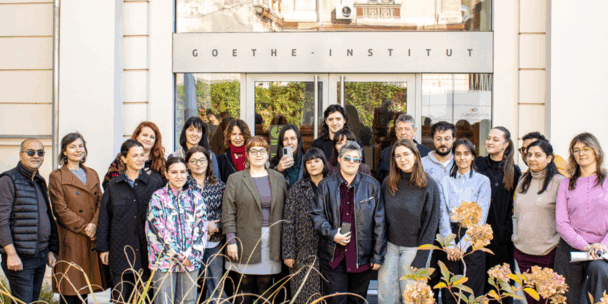7 European organisations launch a new perspective on heritage and intercultural dialogue
European cultural partner organisations gathered under the Training for the Contact Zone (TCZ) project, have developed a new curriculum as part of a new perspective on heritage and intercultural dialogue. This innovative tool proposes a training model for cultural democracy, dialogue, and structural change, built on the principles of co-creation, participation, and critical reflection.
A new perspective on heritage and intercultural dialogue
Training for the Contact Zone (TCZ) is a European project dedicated to rethinking adult education, with a special focus on museums and learning processes through heritage. The program invites practitioners, artists, mediators, cultural workers, and activists to explore how art, culture, and heritage spaces can function as Contact Zones — not as places where differences are blurred, but as spaces where they are recognized, embraced, and transformed into a shared ground for learning and collaboration.
The TCZ curriculum is building on the experiences of the Heritage Contact Zone (HCZ) project, the curriculum expands this approach through a modular training process that combines theoretical foundations, practical tools, and critical reflection.
A Contact Zone is not a fixed model, but a dynamic space of co-creation, negotiation, and participation. Differences are not suppressed but used as a resource for learning, transformation, and inclusion. Through art, dialogue, and shared reflection, these spaces enable the ethical and creative exploration of conflicts, silences, and contested memories.
The curriculum is designed for cultural professionals, curators, artists, mediators, and activists. The training offers theoretical content, practical exercises, case studies, and resources adaptable to various local contexts.
A European co-creation process
The curriculum was developed through a participatory process, coordinated by the seven partners of the TCZ consortium. Following a needs assessment and a co-creation workshop in Porto, Portugal, the team defined the core principles of the training — Know, Trust, Co-create — and structured the content into interconnected modules, which can be completed independently or as part of a full program. A Curriculum Committee ensured coherence, transparency, and alignment with the project’s core values: participation, inclusion, and critical reflection. The result is a flexible, practice-based framework that supports cultural professionals in navigating complexity and facilitating ethical and plural processes of working with heritage and memory.
Pilots trainings across Europe, autumn 2025
The finalisation of the curriculum was followed by a series of pilot programs in three European cities, where the content was tested with groups of heritage specialists, cultural managers, museum staff, mediators, and activists.
- 29.09 – 1.10 Amsterdam (NL), Herengracht401 – featuring a program focused on identity, memory, and colonial heritage, exploring practices of cultural mediation, mindfulness, and collective mapping.● 22-24.10 Bucharest (RO), Goethe-Institut Bucharest – offering a course centered on critical reflection on memory, cultural amnesia, and representations of the Roma community.
- 12-14.11 Vitoria-Gasteiz (ES) Conexiones improbables – hosting a workshop dedicated to exploring memory as a living and collaborative process, within the context of recent Basque history.
A participant of the TCZ training in Amsterdam: “I leave the program carrying with me not only new perspectives but also a phrase that truly resonated with me: ‘a safe space for unsafe conversations.’ This idea encapsulates much of what I gained and will continue to guide my reflections moving forward.”
These pilot programs contribute to validating the curriculum and refining the methods before their wider implementation at the European level through TCZ Trainings in the first quarter of 2026
An open and adaptable learning framework
The curriculum can be used as a comprehensive training program, as independent modules, or as a source of inspiration for developing one’s own facilitation methodologies. The program encourages adaptation to the local context, interdisciplinary dialogue, and collaboration with professionals from related fields — from psychologists and conflict mediators to artists and community educators.
Frans Damman, co-director lead partner H401: “Museums and heritage sites are ideally suited to the “contact zones” approach; these often emotionally charged places lend themselves to open and honest dialogue without the need to convince others of one’s own rightness. The value of Training for the Contact Zone lies within our museums or heritage sites, but also in recognising these valuable exchanges outside the walls of our cultural institutions. The moments when people actually listen and exchange ideas without judgement, the ‘contact zones’, can take place everywhere and are of great importance throughout our society. Particularly now, where populism and hate speech are on the rise. When I think about how everyone can create meaningful change towards more trust and social cohesion these TCZ meetings contribute to how we want to imagine a better world.”
Training for the Contact Zone is co-funded by the European Union through the Erasmus+ – Adult Education program. The project brings together cultural and educational organizations from across Europe, engaged in developing new forms of learning through culture and heritage.
Partner organizations of the TCZ consortium: Herengracht 401 Amsterdam (NL) – lead partner; Conexiones Improbables Vitoria-Gasteiz (ES); Culture Action Europe Brussel (BE); Etz Hayyim Synagogue, Chania (GR); Goethe-Institut Bucharest (RO); Humán Platform Budapest (HU); PELE Porto (PT);
Contact: training@contactzone.eu / Facebook https://fb.me/e/5ctr2EUlO
Website: https://trainingcontactzone.eu/conference/
